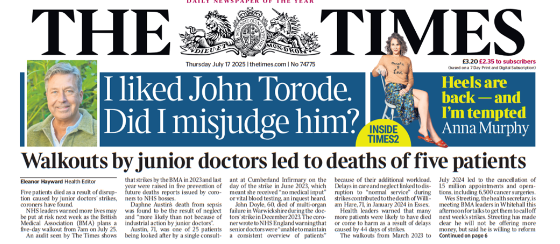


18/07/2025

In an attack on the British Medical Association's decision to pursue further industrial action in support of better pay and conditions for junior doctors, The Times has cynically misrepresented the impact of previous strikes.
Yesterday, July 17th, the Times published an article on its frontpage declaring:
“Walkouts by junior doctors led to deaths of five patients”
Anyone reading that headline would understand that five people died, primarily - if not exclusively - due to doctors’ strikes. The article goes on to say that this claim is based on an audit of coroners’ reports, which they have "seen" but do not publish.
As is often the case with The Times, the reality is very different to what the newspaper has reported.
Of the five cases referred to in the headline, only three are named in the article, and the relevant coroner reports are all in the public domain.
One of them is Mr D. The coroner’s report into his death lists six “concerns”, none of which refer to industrial action. Although the coroner refers to the strike as one factor which contributed to “inconsistent care”, she foremostly lists “natural causes against a background of missed opportunities” as being responsible for his death.
Another case referred to is Mr H. Once again, the list of “concerns” raised did not touch on the strikes. In fact, this patient had suffered a catalogue of delays and missed opportunities to address his illness, over an extended period. In only one of these delays are strikes referenced, as one factor among several others.
Finally, there is the case of Ms A.
Although The Times is on marginally stronger ground here, with the coroner raising the impact of the strikes on Ms A’s death more directly, his main concern is with the inadequate planning undertaken by the relevant Trust to ensure that patients would be looked after during the strike.
The other cases picked up by this mysterious and unpublished "audit" are not even referenced; leaving us unable to verify whether The Times has any basis whatsoever to blame those deaths on strike action too.
Altogether, it is untrue and misleading to attribute these deaths to the strikes as The Times has done. At best, industrial action (or at least the quality of the planning to mitigate its impact) was one relatively minor factor (according to most of the coroner reports) among many others in the standard of care these patients received.
The question of whether it is appropriate for the BMA to pursue further strikes, and how the Government should respond, is an important matter of public debate. The Times is corrupting that debate by publishing this kind of false and misleading characterisation.
The Times’ agenda
The Times reveals its agenda throughout the article, which quotes five individuals or organisations critical of the strikes, and only one (almost at the very end, and followed by a hostile reply) in support.
That’s not a regulatory matter, but it does demonstrate The Times’ campaigning and partisan approach to the issue. One wonders what the deceased would make of the circumstances of their deaths being exploited to further such an agenda.
More concerning is the question of how this unpublished and misleading “audit” reached The Times in the first place. The quote which gets pole position in the article is a “Whitehall source”, who is scathing about the strikes; accusing the BMA of “unfathomable disregard for the wellbeing of patients”. It is helpful to the Government's negotiating position with the BMA to portray striking doctors in this way, as they are keen to apply pressure to the Association to force a favourable resolution.
This raises the possibility that it was this source – an official or politician, perhaps in the Health Department – who also provided the dodgy “audit”. It is not clear why else the article would be so coy about the source of the information, which is all in the public domain.
Because although they like to claim they “hold truth to the power”, the reality is that most national newspapers – including The Times – have unhealthily close relationships with politicians. It is entirely possible that this is another case of a newspaper promoting the interests of the Government, misleading their readers in doing so, rather than holding authority to account.
In any case, a competent regulator would step in and order The Times to correct the headline and explain themselves. But The Times is in IPSO, a complaints-handler controlled by the press itself, which has never fined or investigated a newspaper in history. The chances of them taking robust action on this story are close to zero.
Junior doctors, patients, voters and the wider public all deserve better than a newspaper industry which misleads and misinforms us. That’s why it is critical that the Government follow through on their promises to introduce independent regulation.
By submitting your details you agree to receive email updates about the campaign. We will always keep your data safe and you may unsubscribe at any time.


